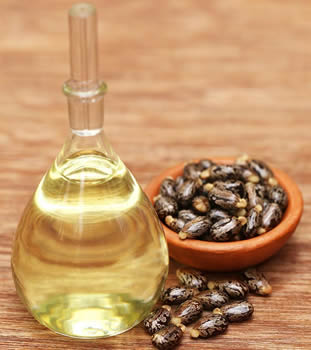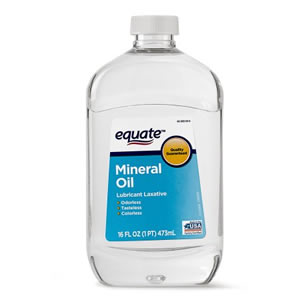Difference between Castor Oil and Mineral Oil
Key Difference: The main difference between Castor Oil and Mineral Oil is the source from which they are derived. Castor Oil it is derived from the seeds of the castor oil plant, whereas mineral oil is a liquid by-product of refining crude oil to make gasoline and other petroleum products.
 Castor Oil and Mineral Oil are two different types of oil. Obviously, the main difference between the two is the source from which they are derived. Castor Oil is a type of vegetable oil, i.e. it is derived from a vegetable, the seeds of the castor oil plant, to be exact. Mineral Oil, on the other hand, most commonly is a liquid by-product of refining crude oil to make gasoline and other petroleum products.
Castor Oil and Mineral Oil are two different types of oil. Obviously, the main difference between the two is the source from which they are derived. Castor Oil is a type of vegetable oil, i.e. it is derived from a vegetable, the seeds of the castor oil plant, to be exact. Mineral Oil, on the other hand, most commonly is a liquid by-product of refining crude oil to make gasoline and other petroleum products.
Another difference between the two is the manner in which they are used. Castor oil and its derivatives are commonly used in the manufacturing of soaps, lubricants, hydraulic and brake fluids, paints, dyes, coatings, inks, cold resistant plastics, waxes and polishes, nylon, pharmaceuticals and perfumes. Whereas, mineral oil has variety of uses, including in the fields of Biomedicine, Food Preparation as well as in Mechanical, Electrical and Industrial capacities.
However, the most popular usage of mineral oil is a base in a number of cosmetic products. In fact, baby oil is just another name for mineral oil. One of the reasons why mineral oil is so popular for cosmetics is because it is colorless, odorless, and tasteless. Another reason why mineral oil is popular for cosmetic manufactures is that is it quite inexpensive. Since the demand for gasoline is always there, and mineral oil is a byproduct of gasoline production, mineral oil is constantly being produced.
 Yet, it is exactly for this reason that a lot of questions have been raised regarding the safety and common usage of mineral oil. The primary concern is the fact that since mineral oil is a byproduct of the process that refines crude oil to make gasoline and other petroleum products, it has raised the concern that the production of mineral oil has on the planet. Another concern by some is regarding the safety of mineral oil on the skin, especially on babies, as many equate using mineral oil as using crude oil. However, mineral oil is highly refined before it is sold to the consumers, so these concerns are often unfounded.
Yet, it is exactly for this reason that a lot of questions have been raised regarding the safety and common usage of mineral oil. The primary concern is the fact that since mineral oil is a byproduct of the process that refines crude oil to make gasoline and other petroleum products, it has raised the concern that the production of mineral oil has on the planet. Another concern by some is regarding the safety of mineral oil on the skin, especially on babies, as many equate using mineral oil as using crude oil. However, mineral oil is highly refined before it is sold to the consumers, so these concerns are often unfounded.
Many people tout the fact that castor oil is natural as a reason for their preference over mineral oil. Since, castor oil comes from a plant, many people feel more comfortable using that on their skin, or even to ingest. This is also the reason why castor oil is often used for homeopathic remedies. Nonetheless, castor oil is not without concern. The castor seed contains ricin, a toxic enzyme, which is usually negated through heat during the process of extraction. Hence, while using castor oil is mostly safe, harvesting castor seeds usually have a negative health effects.
Still, it must be noted that both Castor Oil and Mineral Oil each have their own set of benefits and negatives. Which oil one uses and for what purpose is usually a personal choice, and most people do end up using both for different purposes, either directly or as part of another product, such as makeup, creams, lotion, perfumes, etc.
Comparison between Castor Oil and Mineral Oil:
|
|
Castor Oil |
Mineral Oil |
|
Type |
Vegetable Oil |
Mineral Oil |
|
Derived from |
Castor Seeds |
Various minerals but most commonly from petroleum |
|
Uses |
Soaps, lubricants, hydraulic and brake fluids, paints, dyes, coatings, inks, cold resistant plastics, waxes and polishes, nylon, pharmaceuticals and perfumes. |
In the fields of Biomedicine, Food Preparation as well as in Mechanical, Electrical and Industrial capacities, as well as Cosmetics. |
|
Benefits |
Natural |
Cheap and easily available |
|
Concerns |
The castor seed contains ricin, a toxic enzyme. |
Derived from oil – Health implications and impact on Earth |
|
Color |
Slightly Yellowish |
Mostly Colorless |
|
Taste |
Has a distinct taste and odor |
Is tasteless and odorless |
References: Wikipedia (Castor Oil, Mineral Oil), Drugs.com, Reference Image Courtesy: stylecraze.com, walmart.com









Comments
Tyler
Fri, 07/14/2017 - 17:54
You say that you should not consume mineral oil, yet list "Constipation" as a use for it. ???
Val
Wed, 01/14/2015 - 23:45
Add new comment